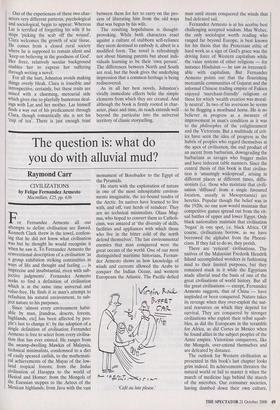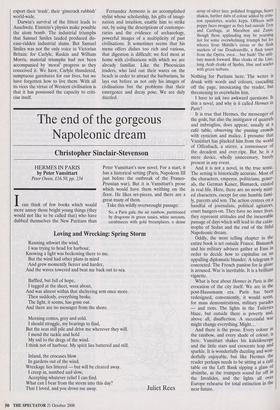The question is: what do you do with alluvial mud?
Raymond Carr
CIVILIZATIONS by Felipe Fernandez Armesto Macmillan, £25, pp. 636 or Fernandez Armesto all our attempts to define civilisation are flawed. Kenneth Clark threw in the towel, confess- ing that he did not know what civilisation was but he thought he would recognise it when he saw it. To Fernandez Armesto the conventional description of a civilisation 'as a group exhibition striking continuities in ways of life and thought and feeling ... is imprecise and insubstantial, riven with sub- jective judgments'. Fernandez Armesto seeks to find a definition of civilisation which is at the same time universal and value-free. He finds it in man's attempt to refashion his natural environment, to sub- ject nature to his purposes. Since 'almost every environment habit- able by man, [tundras, deserts, forests, highlands, etc] has been affected by peo- ple's lust to change it': by the adoption of a single definition of civilisation Fernandez Armesto is free to select from every civilisa- tion that has ever existed. He ranges from the swamp-dwelling Mawkin of Malaysia, technical minimalists, condemned to a diet of easily speared catfish, to the mathemati- cal achievements of the Mayas of the low- land tropical forests; from the Indus civilisation of Harappa to the world of Hesiod and Homer; from the Mongols of the Eurasian steppes to the Aztecs of the Mexican highlands; from Java with the vast monument of Borobudor to the Egypt of the Pyramids.
He starts with the exploitation of nature in one of the most inhospitable environ- ments imaginable, the ice-bound tundra of the Arctic. Its natives have learned to live with, and off, vast herds of reindeer. They are no technical minimalists. Olaus Mag- nus, who hoped to convert them to Catholi- cism, was amazed at 'the diversity of skills, facilities and appliances with which those who live in the bitter cold of the north defend themselves'. The last environmental enemies that man conquered were the great oceans of the world. One of our most distinguished maritime historians, Fernan- dez Armesto shows us how knowledge of winds and currents allowed the Arabs to conquer the Indian Ocean, and western Europeans the Atlantic. The Pacific defied `Café au late please.' man until steam conquered the winds that had defeated sail.
Fernandez Armesto is at his acerbic best challenging accepted wisdom. Max Weber, the only sociologist worth reading who ranged far beyond Europe, is best known for his thesis that the Protestant ethic of hard work as a sign of God's grace was the driving force of Western capitalism while the value systems of other religions — for instance Hinduism — he saw as irreconcil- able with capitalism. But Fernandez Armesto points out that the flourishing mercantile, communities of Gujurat and the informal Chinese trading empire of Fukien enjoyed `merchant-friendly' religions or those for which 'wealth creation was moral- ly neutral'. In two of his aversions he seems to be flogging a moribund horse. He is no believer in progress as a measure of improvement in man's condition as it was to the philosophes of the enlightenment and the Victorians. But a multitude of crit- ics have seen the idea of progress as the hubris of peoples who regard themselves at the apex of civilisation, the end product of an ascent from barbarism, downgrading the barbarians as savages who bugger mules and have indecent table manners. Since the central thesis of this book is that civilisa- tion is 'amazingly widespread', arising in different places at different times, diffu- sionists (i.e. those who maintain that civili- sation 'diffused' from a single favoured location, usually in Mesopotamia) are heretics. Popular though the belief was in the 1920s, no one now would maintain that competitive games spread out from the rit- ual battles of upper and lower Egypt. Only black nationalists maintain that civilisation `began' in one spot, i.e. black Africa. Of course, civilisations borrow, as we have borrowed the alphabet from the Phoeni- cians. If they fail to do so, they perish.
There are 'reticent' civilisations. The natives of the Malaysian Frederik Hendrik Island accomplished wonders in fashioning mud to their limited purposes, but they remained stuck in it while the Egyptians made alluvial mud the basis of one of the great civilisations of world history. But all the great civilisations — except, Fernandez Armesto suggests, that of China — have imploded or been conquered. Nature takes its revenge when they over-exploit the nat- ural resources on which they depend for survival. They are conquered by stronger civilisations who exploit their tribal squab- bles, as did the Europeans in the scramble for Africa, as did Cortes in Mexico when he found allies in the subject peoples of the Aztec empire. Victorious conquerors, like the Mongols, over-extend themselves and are defeated by distance.
The outlook for Western civilisation as presented in this book's last chapter looks grim indeed. Its achievements threaten the natural world or fail to master it when the march of medicine lags behind the march of the microbes. Our consumer societies, having dumbed down their own culture, export their 'trash', their 'gimcrack rubbish' world-wide.
Darwin's survival of the fittest leads to Auschwitz. Einstein's physics make possible the atom bomb. The industrial triumphs that Samuel Smiles lauded produced dis- ease-ridden industrial slums. But Samuel Smiles was not the only voice in Victorian Britain: for Carlyle, Ruskin and William Morris, material triumphs had not been accompanied by 'moral' progress as they conceived it. We have, Carlyle thundered, sumptuous garnitures for our lives, but we have forgotten how to live them. With all its vices the virtue of Western civilisation is that it has possessed the capacity to criti- cise itself. Fernandez Armesto is an accomplished stylist whose scholarship, his gifts of imagi- nation and intuition, enable him to strike out, by using the descriptions of contempo- raries and the evidence of archaeology, powerful images of a multiplicity of past civilisations. It sometimes seems that his menu offers dishes too rich and various, that digestion is difficult; we feel most at home with civilisations with which we are already familiar. Like the Phoenician traders, who laid out their wares on the beach in order to attract the barbarians, he lays out before us not only his images of civilisations but the problems that their emergence and decay pose. We are duly dazzled.


























































































 Previous page
Previous page